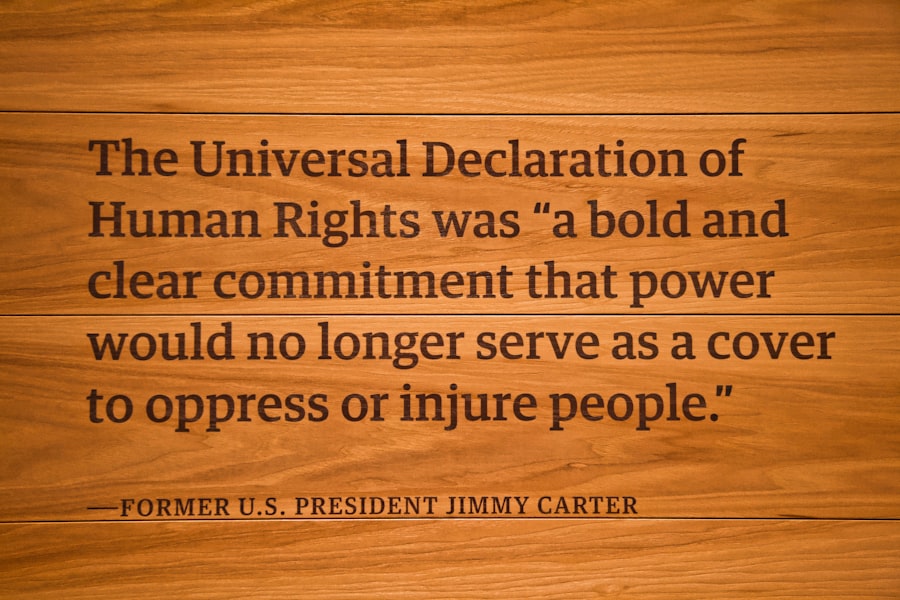The fishing industry, often romanticized for its picturesque scenes of fishermen casting nets into the sea, harbors a darker reality that is frequently overlooked. Human rights abuses within this sector are pervasive and multifaceted, affecting countless individuals across the globe. From exploitative labor practices to human trafficking, the fishing industry is rife with violations that undermine the dignity and rights of workers.
These abuses not only impact the individuals directly involved but also reverberate through entire communities, ecosystems, and economies. As global demand for seafood continues to rise, so too does the urgency to address these human rights violations. The complexity of the fishing industry, characterized by its intricate supply chains and often opaque practices, makes it challenging to pinpoint responsibility.
However, it is crucial to shed light on these issues, as they represent a significant moral and ethical crisis that demands immediate attention. By understanding the scope of human rights abuses in the fishing industry, stakeholders can begin to advocate for change and promote a more just and equitable system.
Key Takeaways
- The fishing industry is plagued by severe human rights abuses, including exploitative labor, child labor, and forced labor.
- Unsafe working conditions and frequent accidents at sea endanger the lives of many fishers.
- Human trafficking and modern slavery are significant issues within the global fishing sector.
- Environmental degradation caused by fishing practices further harms fishing communities and their livelihoods.
- Addressing these abuses requires stronger corporate accountability, government regulation, and international collaboration.
Exploitative Labor Practices in the Fishing Industry
Exploitative labor practices are a hallmark of the fishing industry, where workers often find themselves trapped in cycles of poverty and abuse. Many laborers are subjected to long hours, minimal pay, and harsh working conditions that violate their basic rights.
These workers frequently endure grueling shifts that can last for days on end, with little to no rest or respite. Moreover, the lack of regulation and oversight in many fishing operations exacerbates these exploitative practices. Workers may be forced to sign contracts that they do not fully understand or that contain misleading information about their rights and responsibilities.
In some cases, employers may withhold wages or impose exorbitant fees for food and shelter, effectively trapping workers in a cycle of debt. This exploitation is not only a violation of labor rights but also a fundamental breach of human dignity, as individuals are treated as mere commodities rather than as human beings deserving of respect and fair treatment.
Child Labor and Forced Labor in the Fishing Industry

Child labor remains a pervasive issue within the fishing industry, with countless children being forced into work at sea or in processing plants. These young individuals are often deprived of their childhoods and educational opportunities, as they are compelled to contribute to their families’ income or are exploited by unscrupulous employers. The prevalence of child labor in this sector is particularly alarming, as it not only violates international conventions but also perpetuates cycles of poverty and inequality.
Forced labor is another grim reality faced by many workers in the fishing industry. Individuals may be coerced into working against their will through threats, violence, or deception. In some cases, workers are trafficked from one country to another under false pretenses, only to find themselves trapped in exploitative conditions with no means of escape.
The psychological and physical toll of such experiences can be devastating, leaving lasting scars on individuals and communities alike. Addressing child labor and forced labor in the fishing industry is not merely a legal obligation; it is a moral imperative that requires concerted efforts from governments, NGOs, and consumers alike.
Human Trafficking and Modern Slavery in the Fishing Industry
| Metric | Value | Source/Notes |
|---|---|---|
| Estimated number of forced laborers in fishing industry worldwide | Over 25 million | International Labour Organization (ILO) 2023 |
| Percentage of forced labor cases in global fishing industry | Approximately 17% | Global Slavery Index 2022 |
| Average duration of forced labor on fishing vessels | 6 to 12 months | Human Rights Watch 2021 |
| Reported cases of human trafficking in fishing industry (annual) | 1,500+ | United Nations Office on Drugs and Crime (UNODC) 2023 |
| Percentage of fishing vessels inspected for labor abuses | Less than 10% | Environmental Justice Foundation 2022 |
| Countries with highest reported cases of trafficking in fishing | Thailand, Indonesia, Philippines, Myanmar | Multiple NGO reports 2023 |
| Percentage of trafficked fishers who are migrants | Over 70% | International Organization for Migration (IOM) 2023 |
| Estimated economic value of forced labor in fishing industry annually | Over 10 billion | Walk Free Foundation 2022 |
Human trafficking has emerged as a critical issue within the fishing industry, with many individuals falling victim to modern slavery practices. Traffickers often prey on vulnerable populations, offering false promises of employment and better living conditions. Once ensnared, these individuals may find themselves working under brutal conditions with little hope of escape.
The fishing industry’s reliance on cheap labor creates an environment where trafficking can thrive, as employers seek to maximize profits at the expense of human rights. The consequences of human trafficking extend beyond individual suffering; they also have far-reaching implications for entire communities and economies. When individuals are trafficked into the fishing industry, they contribute to an unsustainable system that undermines legitimate businesses and perpetuates cycles of exploitation.
Furthermore, the stigma associated with trafficking can deter victims from seeking help or reporting their experiences, allowing these abuses to persist unchecked. Combating human trafficking in the fishing industry requires a multifaceted approach that includes prevention, protection, and prosecution efforts at local, national, and international levels.
Unsafe Working Conditions and Accidents at Sea
The fishing industry is notorious for its unsafe working conditions, which often lead to accidents at sea and serious injuries among workers. Fishermen face numerous hazards while working on boats, including rough weather conditions, inadequate safety equipment, and insufficient training. These risks are compounded by the pressure to meet quotas and maximize profits, which can lead to reckless behavior and disregard for safety protocols.
Accidents at sea can have devastating consequences for workers and their families. Injuries sustained during fishing operations can result in long-term disabilities or even fatalities. Moreover, when accidents occur, workers may be reluctant to report them due to fear of retaliation or job loss.
This culture of silence perpetuates unsafe practices and places workers at greater risk. Addressing these issues requires a commitment to improving safety standards within the industry and ensuring that workers have access to proper training and protective equipment.
Impact of Human Rights Abuses on Fishing Communities

The impact of human rights abuses in the fishing industry extends far beyond individual workers; it affects entire communities that rely on fishing for their livelihoods. When workers are exploited or subjected to abusive practices, it undermines the social fabric of these communities and perpetuates cycles of poverty and inequality. Families may struggle to make ends meet when wages are withheld or when workers are forced into debt bondage.
Additionally, human rights abuses can erode trust within communities and create divisions among individuals who should be working together for common goals. The stigma associated with exploitation can deter individuals from seeking help or reporting abuses, further entrenching these issues within communities. As a result, addressing human rights abuses in the fishing industry is not only a matter of protecting individual rights but also a crucial step toward fostering resilient and thriving communities.
Environmental Degradation and Human Rights Abuses in the Fishing Industry
The intersection of environmental degradation and human rights abuses in the fishing industry presents a complex challenge that demands urgent attention. Unsustainable fishing practices not only threaten marine ecosystems but also exacerbate human rights violations among those who depend on these resources for their livelihoods. Overfishing, habitat destruction, and pollution contribute to declining fish stocks, which can lead to increased competition among fishermen and further exploitation of vulnerable workers.
As fish populations dwindle due to unsustainable practices, communities may resort to desperate measures to survive. This can lead to increased instances of human trafficking and forced labor as individuals seek any means necessary to provide for their families. Furthermore, environmental degradation disproportionately affects marginalized communities that rely on healthy marine ecosystems for food security and economic stability.
Addressing environmental issues within the fishing industry is essential for safeguarding both human rights and ecological integrity.
Corporate Responsibility and Accountability in the Fishing Industry
Corporate responsibility plays a pivotal role in addressing human rights abuses within the fishing industry. Companies involved in seafood production must recognize their responsibility to uphold ethical standards throughout their supply chains. This includes conducting thorough audits of labor practices, ensuring transparency in sourcing seafood, and implementing policies that protect workers’ rights.
Accountability mechanisms are essential for holding corporations responsible for their actions. Consumers increasingly demand ethically sourced products, prompting companies to adopt more sustainable practices. However, without robust enforcement mechanisms and regulatory frameworks, many companies may continue to prioritize profits over people.
It is imperative for stakeholders—governments, NGOs, consumers—to work collaboratively to create an environment where corporate accountability is not just encouraged but mandated.
Government Regulation and Enforcement in the Fishing Industry
Effective government regulation is crucial for addressing human rights abuses in the fishing industry. Many countries lack comprehensive laws that protect workers’ rights or fail to enforce existing regulations adequately. This regulatory gap allows exploitative practices to flourish unchecked, leaving vulnerable populations at risk.
Governments must prioritize the development and enforcement of labor laws that protect workers in the fishing industry from exploitation and abuse. This includes establishing minimum wage standards, regulating working hours, and ensuring safe working conditions. Additionally, governments should collaborate with international organizations to strengthen global standards for labor rights in fisheries.
By taking decisive action at both national and international levels, governments can play a vital role in combating human rights abuses within this sector.
International Collaboration and Advocacy for Human Rights in the Fishing Industry
International collaboration is essential for addressing human rights abuses in the fishing industry on a global scale. Organizations such as the International Labour Organization (ILO) work tirelessly to promote labor rights and advocate for vulnerable populations worldwide. Collaborative efforts among governments, NGOs, businesses, and civil society can create a unified front against exploitation in fisheries.
Advocacy campaigns aimed at raising awareness about human rights abuses in the fishing industry are crucial for mobilizing public support and driving change. By highlighting individual stories of exploitation and resilience, advocates can inspire action among consumers and policymakers alike. International partnerships can also facilitate knowledge sharing and best practices among countries grappling with similar challenges in their fishing sectors.
A Call for Action to Address Human Rights Abuses in the Fishing Industry
The pervasive human rights abuses within the fishing industry demand urgent action from all stakeholders involved—governments, corporations, consumers, and civil society organizations alike must come together to address these pressing issues.
It is imperative that individuals recognize their role as consumers in this system; by making informed choices about seafood consumption and advocating for ethical practices within the industry, they can contribute to meaningful change.
The time has come for collective action—only through concerted efforts can we hope to eradicate human rights abuses in the fishing industry and create a more just world for all those who depend on our oceans for their livelihoods.
Human rights abuses in the fishing industry have become a pressing concern, with reports highlighting the exploitation of workers and the detrimental impact on local communities. For a deeper understanding of these issues, you can read more in the article available at Hey Did You Know This. This resource provides insights into the various challenges faced by individuals in the fishing sector and the urgent need for reform to protect their rights.
WATCH THIS! The $10 Billion Lie: Why Your “Dolphin-Safe” Tuna Isn’t Safe
FAQs
What are common human rights abuses in the fishing industry?
Common human rights abuses in the fishing industry include forced labor, human trafficking, unsafe working conditions, wage theft, excessive working hours, and lack of access to medical care. Workers may also face physical and verbal abuse, and in some cases, they are held against their will on fishing vessels.
Which regions are most affected by human rights abuses in the fishing industry?
Human rights abuses in the fishing industry are most prevalent in parts of Southeast Asia, West Africa, and some South American countries. However, these issues can occur globally, especially in regions with weak labor regulations and enforcement.
Why is the fishing industry prone to human rights abuses?
The fishing industry is prone to human rights abuses due to factors such as the isolated nature of fishing vessels, lack of oversight, complex supply chains, and the high demand for cheap seafood. Migrant workers, who often have limited legal protections, are particularly vulnerable.
What international laws address human rights abuses in the fishing industry?
International laws and conventions addressing human rights abuses in the fishing industry include the International Labour Organization (ILO) Work in Fishing Convention (C188), the United Nations Convention on the Law of the Sea (UNCLOS), and various human trafficking and labor rights treaties.
How can consumers help reduce human rights abuses in the fishing industry?
Consumers can help reduce human rights abuses by choosing seafood certified by reputable organizations that enforce labor standards, supporting companies with transparent supply chains, and advocating for stronger regulations and enforcement in the fishing industry.
What role do governments play in preventing human rights abuses in fishing?
Governments play a critical role by enforcing labor laws, conducting inspections of fishing vessels, prosecuting offenders, ratifying international conventions, and collaborating with other countries to monitor and regulate fishing activities.
Are there organizations working to combat human rights abuses in the fishing industry?
Yes, several non-governmental organizations (NGOs) and international bodies work to combat human rights abuses in the fishing industry. These include the International Labour Organization (ILO), Human Rights Watch, Greenpeace, and the Environmental Justice Foundation, among others.
What impact do human rights abuses in the fishing industry have on workers?
Human rights abuses can lead to physical and psychological harm, loss of income, exploitation, and in extreme cases, death. Workers may suffer from malnutrition, injuries, and lack of access to medical care, severely affecting their well-being and livelihoods.
How does forced labor occur in the fishing industry?
Forced labor in the fishing industry often occurs through deceptive recruitment practices, debt bondage, confiscation of identity documents, threats, and violence. Workers may be trapped on vessels for extended periods without the ability to leave.
What measures are being taken to improve labor conditions in the fishing industry?
Measures include implementing and enforcing international labor standards, increasing transparency in supply chains, promoting responsible sourcing by companies, enhancing monitoring and inspection of fishing vessels, and raising awareness about workers’ rights.
